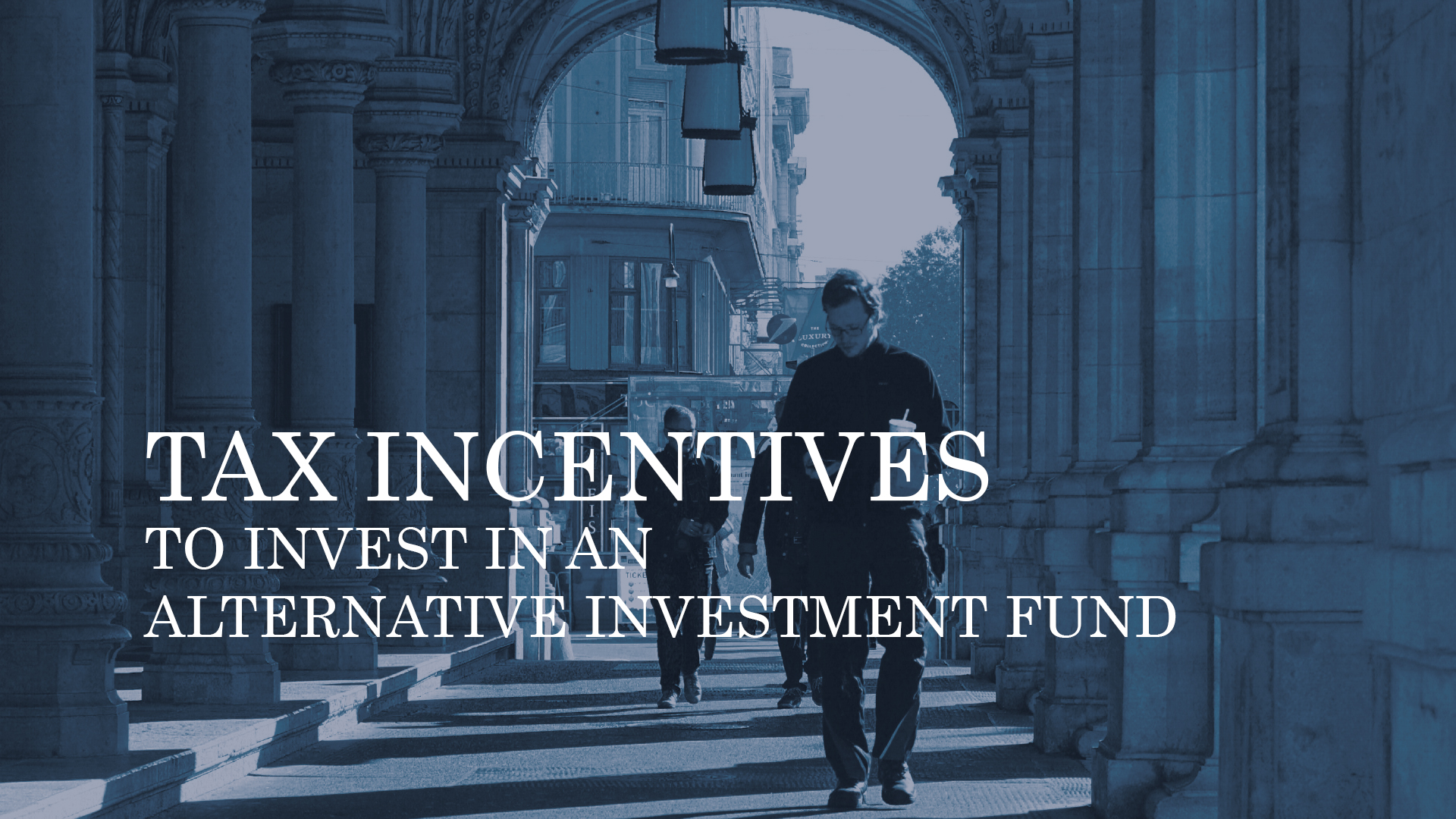TAX INCENTIVES TO INVEST IN AN ALTERNATIVE INVESTMENT FUND (AIF)

Alternative Investment Funds (AIF) enjoy unflagging interest among investors. Since the introduction of restrictions on tax exemptions for Closed-End Investment Funds, investors’ attention has been focused precisely on AIFs. In response to this interest, the legislator eventually began to modify the tax system so as to make the Alternative Investment Fund an attractive investment option.
Since the majority of investment activity consists in rolling over investments in the future rather than in making profits from a given project, an attractive investment program should provide some form of tax exemption for rolled over investments. In other words, in order for the designed vehicle to remain attractive to investors, it must allow current profits to be exempted from taxation if they are allocated to subsequent investment projects, and not for payment to shareholders.
AIF TAX PREFERENCES
One of the basic institutions implemented in this context into the Polish tax system is income tax exemption for the Alternative Investment Fund.
Originally, the exemption provided for in Art. 17 para. 1 point 58a) of the Corporate Income Tax Act [1] ensured that no taxation on the income generated by AIF from the sale of shares in companies, provided that AIF held at least 10% of shares in a given company for an uninterrupted period of at least two years.
Importantly, when compared to, among others, the exemption from taxation of dividends paid between subsidiaries (i.e., Art. 22 para. 4 of the Corporate Income Tax Act), in the case of exemption from capital gains of AIF, the two-year period must be completed at the time of sale. Thus, it is not possible to benefit from the exemption for the Alternative Investment Fund if the shares are sold within two years from their acquisition. Even if after the sale of the investment, the AIF still holds an appropriate percentage of the shares for two years. The exemption shall not apply until two years have elapsed.
Starting from 1 January 2022, the requirements for obtaining an exemption by the Alternative Investment Fund were relaxed, however, only in the scope of the required share in the company. Currently, it is possible for an Alternative Investment Fund to benefit from the tax exemption on profits from the sale of shares if it held at least 5% of the shares of a given company before the sale (compared to 10% before the change). The two-year period of shareholding has not been changed.
Importantly, the exemption in question does not apply to the sale of shares of companies whose asset value directly or indirectly consist in at least 50% of real estate located in Poland.
The exclusion of AIF from the regulation on the so-called insufficient capitalization may be indicated as an additional tax preference used by the Alternative Investment Fund. This means that entities operating as AIFs will be able to benefit from charging debt financing costs, including interest on loans or bonds, into the tax-deductible costs in full. This is an additional facilitation which allows for carrying out leveraged investments more efficiently, without the need to calculate the potential exclusion of part of the financial costs from the tax costs each time. At the same time, it ensures significant tax savings for the entities conducting leveraged investments, as the total financial cost may reduce the company’s current taxable income.
PREFERENCES FOR THE INVESTORS OF AN ALTERNATIVE INVESTMENT FUND
On the wave of tax changes in Poland, at the beginning of January 2022, another tax preference concerning AIF was also added, this time for investors.
The new investment relief consists in the possibility of charging an additional 50% of expenses incurred for the purchase or acquisition of shares in an Alternative Investment Fund into tax-deductible costs. Importantly, an investor who has acquired a company in which an Alternative Investment Fund holds at least 5% of shares may also benefit from the deduction. Or in a company in which AIF is yet to acquire at least 5% of the shares within 90 days of the date on which the investor takes up shares or stocks.
The deduction may be used in the tax year in which the expenditure was incurred. Thus, the investor may increase annual tax-deductible costs (i.e., reduce the tax for a given year accordingly) already at the time of acquiring the investment (in accordance with regular principles, the costs of the acquisition of shares or stocks are settled only at the time of their sale). Of course, all acquisition costs can be additionally recognized as the costs incurred at the time of selling the investment.
However, it should be remembered that the new relief has been made subject to a number of conditions, including:
- deduction in a given year may not exceed a total of PLN 250,000 for the investor;
- the investor is entitled to a deduction when there is a shareholder in AIF who has acquired shares financed in whole or in part from European funds intended for venture capital investments in Poland (it is enough to have one shareholder in AIF with such parameters to secure the relief for other investors);
- an investment agreement must be concluded between the investor and AIF (for an investment in a given AIF or for a joint investment with AIF in another entity, where the AIF takes up at least 5% of the shares in that entity);
- the investor must be an entity which was unaffiliated with both AIF and the company being the object of investment for a period of at least 2 years immediately preceding the transaction;
- it is obligatory for the investor to have held the shares on which they benefit from the relief for at least 24 months.
CONCLUSION
The market practice will show whether the changes introduced will lead to an even greater increase in the attractiveness of AIF among investors. Certainly, lowering the investment threshold guaranteeing the exemption of AIFs from Corporate Income Tax to 5% is an important step towards using Alternative Investment Funds for greater diversification of investments. As a result, AIFs will be able to benefit from exemptions with a greater number of investments. Nevertheless, imposing the requirement to hold shares for at least two years before the disposal, even if the threshold is lowered to 5%, may hinder the development of the AIF market. Entering into medium-term investments may become decreasingly popular, especially in an uncertain market situation.
On the other hand, the introduction of new investor preferences may encourage conducting investments in AIFs. Especially since the new investor relief is also available when the investment is not directly related to AIF, but when AIF is one of the investors in another entity. However, a number of conditions attached to the eligibility for this relief may deter some investors.
Regardless of how the introduced tax changes may be assessed, AIF remains one of the most interesting investment vehicles currently available in Poland, and it is certainly worth considering this option when planning investment operations.
[1] Act of 15 February 1992 on Corporate Income Tax (i.e., Journal of Laws of 2021, item 1800, as amended), hereinafter: the CIT Act

Blog edited by dr Anna Maria Panasiuk

Founder and Managing Partner of Panasiuk & Partners, with many years of expertise in wealth management.
Authors
dr Maja Czarzasty- Hercberg
OF COUNSEL/ATTORNEY-AT-LAW
Dorota Sajewicz
investment partner
dr Adam Barcikowski
Head of Tax | Certified Tax Advisor
Marta Kwiatkowska - Abramowska
legal assistent
Sylwia Rozwandowicz
ADVOCATE
Sylwia Rybicka
dyrektor ds. rozwoju
Michał Nowacki
radca prawny
Paweł Turek
doradca podatkowy
Katarzyna Zając
aplikant radcowski
Yours Panasiuk
Antoni Goraj
radca prawny
Edyta Winnicka
prawnik
Paweł Szumowski
aplikant radcowski
Yours Panasiuk
Katarzyna Bieńkowska
radca prawny,
doradca podatkowy YOURS Panasiuk
Kamil Kowalik
doradca podatkowy
Monika Baran
radca prawny
Adam Apel
doradca podatkowy
Piotr Świąć
adwokat
Sabina Tyszko
tax consultant
Szczepan Adamski
OF COUNSEL | LAWYER | PRESIDENT OF THE MANAGEMENT BOARD OF YOURS SP. Z O.O.
Magda Kwiatkowska
radca prawny
Andrzej Sałamacha
PARTNER | ATTORNEY-AT-LAW | CERTIFIED INSOLVENCY AND RESTRUCTURING ADVISOR
dr Anna Maria Panasiuk
managing partner | advocate | wealth advisor
Maciej Małachowski
TRAINEE ATTORNEY-AT-LAW
Klaudia Borkowska
Advocate trainee
Archives
-
2024

-
2023

-
2022

-
December

- POLISH FAMILY FOUNDATION – A new solution for entrepreneurs
- POLSKA FUNDACJA RODZINNA – nowe rozwiązanie dla przedsiębiorców
- INVESTMENT FUNDS IN THE NETHERLANDS – ABC OF SETTING UP OF AIF
- FUNDUSZE INWESTYCYJNE W HOLANDII – ABC ZAŁOŻENIA AFI
- TAX INCENTIVES TO INVEST IN AN ALTERNATIVE INVESTMENT FUND (AIF)
- ZACHĘTY PODATKOWE DO INWESTYCJI W ALTERNATYWNĄ SPÓŁKĘ INWESTYCJNĄ (ASI)
-
November

-
October

- CAN AN ALTERNATIVE INVESTMENT FUND SERVE THE PURPOSES OF PRIVATE INVESTMENTS?
- CZY ALTERNATYWNA SPÓŁKA INWESTYCYJNA MOŻE SŁUŻYĆ PRYWATNYM INWESTYCJOM?
- M&A – TRANSACTION TRIVIA IN MERGERS & ACQUISITIONS
- M&A – CIEKAWOSTKI TRANSAKCJI MERGERS & ACQUISITION
- HISZPAŃSKA REZYDENCJA PODATKOWA – PUZZLE DLA WTAJEMNICZONYCH!
- Spanish tax residence – jigsaw puzzles for the initiated!
-
September

-
August

-
July

-
May

- PODWÓJNA REZYDENCJA PODATKOWA – 4 PRZYKŁADY POWSTANIA [CZĘŚĆ II OSOBY PRYWATNE]
- DUAL TAX RESIDENCE – 4 EXAMPLES OF ITS EMERGENCE [PART II NATURAL PERSONS]
- INVESTORS’ Q&A ABOUT THE ALTERNATIVE INVESTMENT FUNDS
- O CO NAJCZĘŚCIEJ PYTAJĄ INWESTORZY W KONTEKŚCIE ASI (ALTERNATYWNYCH SPÓŁEK INWESTYCYJNYCH)?
- REVOLUTION ON THE MERGERS & ACQUISITIONS MARKET – RECORD-BREAKING M&A TRANSACTIONS IN POLAND
- REWOLUCJA NA RYNKU FUZJI I PRZEJĘĆ – REKORDOWE TRANSAKCJE M&A W POLSCE
- 7 SINS COMMITTED WHILE RUNNING A BUSINESS AND MAKING INVESTMENTS
- 7 GRZECHÓW PRZY PROWADZENIU BIZNESU I INWESTYCJACH
-
April

-
March

-
February

- SIMPLE CONSERVATIVE INVESTMENTS. HISTORICAL ANALYSIS OF THE LAST 20 YEARS
- PROSTE INWESTYCJE KONSERWATYWNE. ANALIZA HISTORYCZNA OSTATNICH 20 LAT
- CZY WARTO ZAMIESZKAĆ W HISZPANII? PRAWO BECKHAMA, CZYLI JAK NIE PŁACIĆ PODATKÓW W HISZPANII
- IS IT WORTH LIVING IN SPAIN? BECKHAM ‘S LAW, HOW TO AVOID PAYING TAXES IN SPAIN
- ESTONIAN CIT 2022 AS A REMEDY FOR THE POLISH DEAL
- ESTOŃSKI CIT 2022 JAKO REMEDIUM NA POLSKI ŁAD
-
January

- HOW CAN YOU SET UP AN ALTERNATIVE INVESTMENT FUND IN A FEW WEEKS?
- JAK MOŻNA ZAŁOŻYĆ ALTERNATYWNĄ SPÓŁKĘ INWESTYCYJNĄ W KILKA TYGODNI?
- DO CLOSED-END INVESTMENT FUNDS STILL PAY OFF?
- CZY FUNDUSZE INWESTYCYJNE ZAMKNIĘTE JESZCZE SIĘ OPŁACAJĄ?
- 6 REASONS WHY IT IS WORTH DEVELOPING A BUSINESS OUTSIDE POLISH BORDERS
- 6 POWODÓW, DLA KTÓRYCH WARTO ROZWIJAĆ BIZNES POZA POLSKĄ
-
December
-
2021

-
December

-
November

-
October

- LIFE IN TENERIFE – TAXES AND REAL ESTATE IN THE CANARY ISLANDS
- TENERYFA NA ŻYCIE – PODATKI I NIERUCHOMOŚCI NA WYSPACH KANARYJSKICH
- TURNKEY REORGANISATION – HOW TO PREPARE A BUSINESS FOR INTERNATIONAL EXPANSION
- REORGANIZACJA POD KLUCZ CZYLI JAK PRZYGOTOWAĆ BIZNES NA EKSPANSJĘ ZAGRANICZNĄ
- BUSINESS EXPANSION OUTSIDE THE EU – LET’S HAVE A LOOK AT OTHER CONTINENTS
- EKSPANSJA BIZNESU POZA UE – SPÓJRZMY NA INNE KONTYNENTY
-
September

-
August

- MAJĄTEK RODZINNY
- COMPANY RELOCATION WITHIN THE EU: PROCESS ANALYSIS AND CASE STUDY
- PRZENIESIENIE SPÓŁKI W OBRĘBIE UE: ANALIZA PROCESU I CASE STUDY
- SCALING UP BUSINESS. TAXES IN ESTONIA, ITALY, UNITED KINGDOM, MALTA AND CYPRUS – COMPARISON
- EKSPANSJA BIZNESU. PODATKI W EUROPIE.
- POLSKI ŁAD OCZAMI PRZEDSIĘBIORCY
-
July

- EXPANDING NEXT DOOR – THE CZECH REPUBLIC, SLOVAKIA, GERMANY, ROMANIA
- EKSPANSJA PO SĄSIEDZKU – CZECHY, SŁOWACJA, NIEMIECY, RUMUNIA
- CONVERTIBLE DEBT IN POLAND
- CONVERTIBLE DEBT PRZY INWESTYCJACH PRE-SEED
- AIFs (ALTERNATIVE INVESTMENT FUNDS) LEAD THE WAY ON THE POLISH CAPITAL MARKET
- ASI WIEDZIE PRYM NA POLSKIM RYNKU KAPITAŁOWYM
- FAMILY FOUNDATIONS IN POLAND. CONCEPT VERSUS ENTREPRENEURS’ EXPECTATIONS
- FUNDACJA RODZINNA W POLSCE. ISTOTA POMYSŁU A OCZEKIWANIA PRZEDSIĘBIORCÓW
-
June

- CORPORATE TAX RELIEF AND INCENTIVES FOR INVESTORS – NEW (BETTER?) SOLUTIONS
- ULGI PODATKOWE I ZACHĘTY DLA INWESTORÓW – IDZIE NOWE (LEPSZE?)
- 9% CIT ZAMIAST 19%, JAK PŁACIĆ NIŻSZY PODATEK
- CYPRUS VS. UNITED ARAB EMIRATES, WHERE TO MOVE? CHANGE OF TAX RESIDENCE
- CYPR VS. ZJEDNOCZONE EMIRATY ARABSKIE, GDZIE SIĘ WYPROWADZIĆ? ZMIANA REZYDENCJI PODATKOWEJ
-
May

-
April

-
March

-
February

-
January

- 6 MAJOR CHANGES IN THE BEHAVIOUR OF PRIVATE INVESTORS AND THEIR PORTFOLIOS IN 2020
- 6 GŁÓWNYCH ZMIAN W ZACHOWANIACH I PORTFELACH INWESTORÓW PRYWATNYCH W ROKU 2020
- TAX SIMPLIFICATION 2021 IN POLAND – A MAGNET FOR FOREIGN INVESTORS
- UPROSZCZENIA PODATKOWE 2021 W POLSCE – MAGNESEM DLA INWESTORÓW ZAGRANICZNYCH
- ALTERNATIVE INVESTMENT FUND (AIF) – A FIRST-CLASS INVESTMENT VEHICLE AT YOUR FINGERTIPS
- ALTERNATYWNA SPÓŁKA INWESTYCYJNA (ASI). PIERWSZORZĘDNY WEHIKUŁ INWESTYCYJNY NA WYCIĄGNIĘCIE RĘKI
- ESTONIAN CIT – EFFECTIVE REDUCTION IN CORPORATE TAX IN POLAND
- CIT ESTOŃSKI – EFEKTYWNE OBNIŻENIE OPODATKOWANIA SPÓŁEK W POLSCE
-
December
-
2020

-
December

-
November

- WE BREAK STEREOTYPES! PRECONCEPTIONS ABOUT LAWYERS AND THE REALITY OF BUSINESS
- AM I REALLY SAVING MYSELF MONEY? TODAY I WILL SAVE 100 PLN TO LOSE 1000 PLN TOMORROW
- ŁAMIEMY STEREOTYPY! CZYLI PRZEKONANIA O PRAWNIKACH, A REALIA BIZNESU
- CZY TO NAPRAWDĘ OSZCZĘDNOŚĆ? DZIŚ „ZAOSZCZĘDZĘ” 100 ZŁ ŻEBY JUTRO STRACIĆ 1000 ZŁ
- ZAPRASZAMY do MONAKO
- WHY IS IT WORTH BECOMING A TAX RESIDENT OF MONACO?
- DLACZEGO WARTO ZOSTAĆ REZYDENTEM MONAKO? PODATKI W MONAKO
-
October

-
September

-
August

-
June

- THE WORLD IS CHANGING, AND YOU ARE STILL LOOKING FOR A UNICORN? In this article, we tell you everything you need to know to find one
- ŚWIAT SIĘ ZMIENIA, A TY WCIĄŻ SZUKASZ JEDNOROŻCA. Wszystko co musisz wiedzieć aby go znaleźć napisaliśmy tutaj
- KRYZYSOWE INWESTYCJE, CZYLI: ODWAŻNA INWESTYCJA WYMAGA OSTROŻNEGO PLANOWANIA
- JAK TRWOGA TO DO PRAWNIKA – NIEPOKOJĄCE TENDENCJE WŚRÓD STARTUPÓW
-
May

-
April

- AMERICAN TAX COMPETITION. HELPFUL OR “HARMFUL”
- KONKURENCJA PODATKOWA PO AMERYKAŃSKU. POŻĄDANA, CZY „SZKODLIWA”
- PIENIĄDZE TO NIE WSZYSTKO. Czyli jak inwestować, żeby nie stracić
- INVESTING IN HARD TIMES: HOW TO SET UP YOUR BUSINESS IN NEW YORK
- APETYT NA INWESTYCJE W TRUDNYCH CZASACH. SPÓŁKA W NOWYM YORKU
- WPŁYW PANDEMII NA TRANSAKCJE FUZJI I PRZEJĘĆ
- IMPACT OF A PANDEMIC ON MERGERS AND ACQUISITIONS
- PODATKI NA TRUDNE CZASY
-
March

-
February

-
December
-
2019

-
2018

-
2017

-
2016

-
2015

-
December

-
November

- Zwrot PCC od czynności restrukturyzacyjnych z udziałem spółek komandytowo-akcyjnych
- Zmiany podatkowe na Cyprze zachętą dla potencjalnych inwestorów
- Cypryjskie fundusze inwestycyjne mogą korzystać ze zwolnienia podatkowego w Polsce
- Nowe sankcje za niezłożenie sprawozdania finansowego
- Europejskie poświadczenie dziedziczenia
-
October

-
July

-
December
Categories
- Alternative Investment Fund (15)
- Expansion (12)
- Investments (34)
- Jurisdictions (11)
- Law (13)
- M&A (11)
- POLISH FAMILY FOUNDATION (2)
- Polish Holding Company (2)
- Relocation (9)
- Reorganisation (6)
- Succession (9)
- Tax (28)
- Tax accounting (2)
- Tax Preferences (2)
- Tax Residence (10)
- Wealth Advisory (9)
New publications
You want to be up to date, enter your e-mail address and you will receive new publications straight to your inbox:

